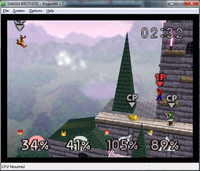Project64k
Project64k is a modified version of the Nintendo 64 emulator, Project64 1.6. It was originally created by Hotquik and is currently developed by Smasherx74. As a Nintendo 64 emulator, the program has the ability to run Super Smash Bros., as well as a majority of the Nintendo 64's library. Project64k's name is a pun on the term 56k.
Compared to many other emulators of its type, including its base project of Project64, Mupen64Plus, 1964, and other projects, Project64k remains one of the most commonly used emulators in the Smash community due to its built-in ability to play games with others via the Internet with Kaillera. As a result of this, a majority of online tournaments for Super Smash Bros. are held with the emulator, often either via servers such as Atlantis Smash, or, more frequently, via peer-to-peer connections. Although a number of Nintendo 64 emulators have started to support online play, such as Mupen64k, Project64k is still the most widely used emulator for Smash 64 netplay, owing to the greater familiarity of the emulator; that said, a number of hacks for emulators can allow for crossplay between Project64k and Mupen64Plus.
Project64k has notably seen use at tournaments for Smash 64, and the use of the emulator is actually preferred by some players, who may use unusual controllers for the game outside of the standard Nintendo 64 controller, such as keyboards.
Outside of these facilities for netplay, the emulator has also been popular for its use in tool-assisted superplays, due to its extensive hacking capabilities that feature compatibility with GameShark and Action Replay, and other features, such as frame-by-frame play.
Despite popular belief, Project64k software in isolation is not inherently illegal to own and operate. In the United States, several lawsuits have ruled in favor of emulators falling under fair use, such as Sega v. Accolade in 1992 and Sony Computer Entertainment, Inc. v. Connectix Corporation and Sony Computer Entertainment America v. Bleem in 2000, as well as the Digital Millennium Copyright Act declaring emulators as exempt from standard copyright protections. However, most methods to obtain games in a format that can actually be played on an emulator are considered piracy, which is illegal, so players are often warned to use emulation at their own discretion.
